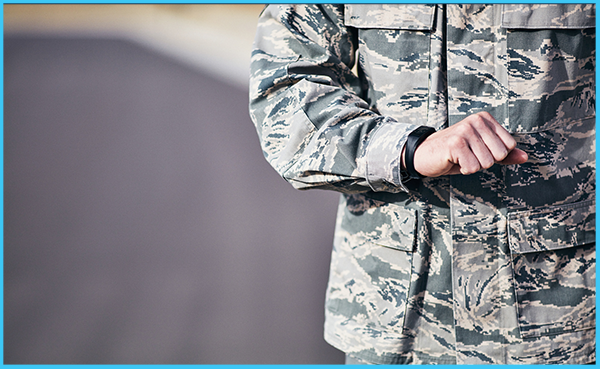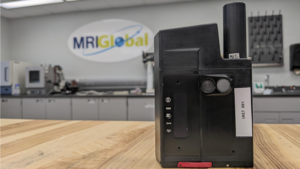
Every morning, more than 1.4 million Americans wake up and serve their country as active-duty armed forces. That is the population of Dallas or San Diego and is three-quarters of the Kansas City Metro. Some of these members are training for or serving on the front lines of confrontations that are more dangerous and demanding than any other situation imaginable. Eric Pritz, Principal Engineer at MRIGlobal, wakes up daily designing technology that helps keep them safe.

Eric Pritz
Soldiers have always encountered conditions that are difficult to handle. Technological advancements have created new possibilities for protecting these soldiers from high-stress situations. For Pritz, there is an opportunity in wearable sensors that can detect, record, track and transmit physiological data from soldiers in rest, training, and combat to their commanding officers. “Health sensor data such as heart rate, respiration rate, pulse oximetry, and body temperature are all processed, often using sophisticated algorithms, to determine the health status of operators in near real-time. This health status may be relayed to decision-makers and health professionals anywhere in the world, allowing for situational awareness and immediate, well-informed action in case of a health emergency,” Pritz said.
The capability of sensing and tracking this data on a person is continuously evolving, but the information is only as good as what you can do with it. Currently, processing capability, wireless networks, and software provide actionable insights into soldiers’ states to protect their health and condition. “In the case of a warfighter, it is particularly vital to provide timely detailed alerts to command in case of injury, exposure, or overexertion such as heat stress or dehydration. Even frequent feedback can provide valuable awareness of mission status and level of exertion,” Pritz said.
Working for MRIGlobal allows Pritz to move faster by collaborating with coworkers and industry partners who provide expertise across a wide range of STEM fields. For more than 75 years, MRIGlobal has used science and technology to create solutions for a safer, healthier, more sustainable world. When working for government agencies such as the US military, knowing he is developing solutions to protect others gives Pritz immense pride and accomplishment.
 The current point in the project is reaching an exciting moment of utility. “This is an exciting time for sensor integration with a lot of development in data science and sensor technology. As sensors progress, quality data becomes more accessible in more scenarios, leading to many possibilities for integration into new applications,” Pritz said. This technology will create better training processes, faster reaction to adverse conditions, and safer service members.
The current point in the project is reaching an exciting moment of utility. “This is an exciting time for sensor integration with a lot of development in data science and sensor technology. As sensors progress, quality data becomes more accessible in more scenarios, leading to many possibilities for integration into new applications,” Pritz said. This technology will create better training processes, faster reaction to adverse conditions, and safer service members.
Pritz has been fascinated by science and technology for as long as he can remember. “I have always been intrigued with how an understanding of the physical world can be applied. As a kid, I was amazed whenever I figured out a new ‘trick’ I could use to build something fun. As an adult, I find it particularly satisfying to apply what I have learned to improve the health and safety of the world.,” Pritz said. In engineering, Pritz has had opportunities to design electromechanical systems and devices for unique National Defense projects.
As technology advances, there is an obligation to better serve the warfighter and the first responder. Pritz and his team at MRIGlobal use real-time health data and mobilize protective action. With an improved understanding of what soldier’s face, healthier experiences and better control over undesirable outcomes can be achieved. This mission can ensure that warfighters share more days with their family and friends.